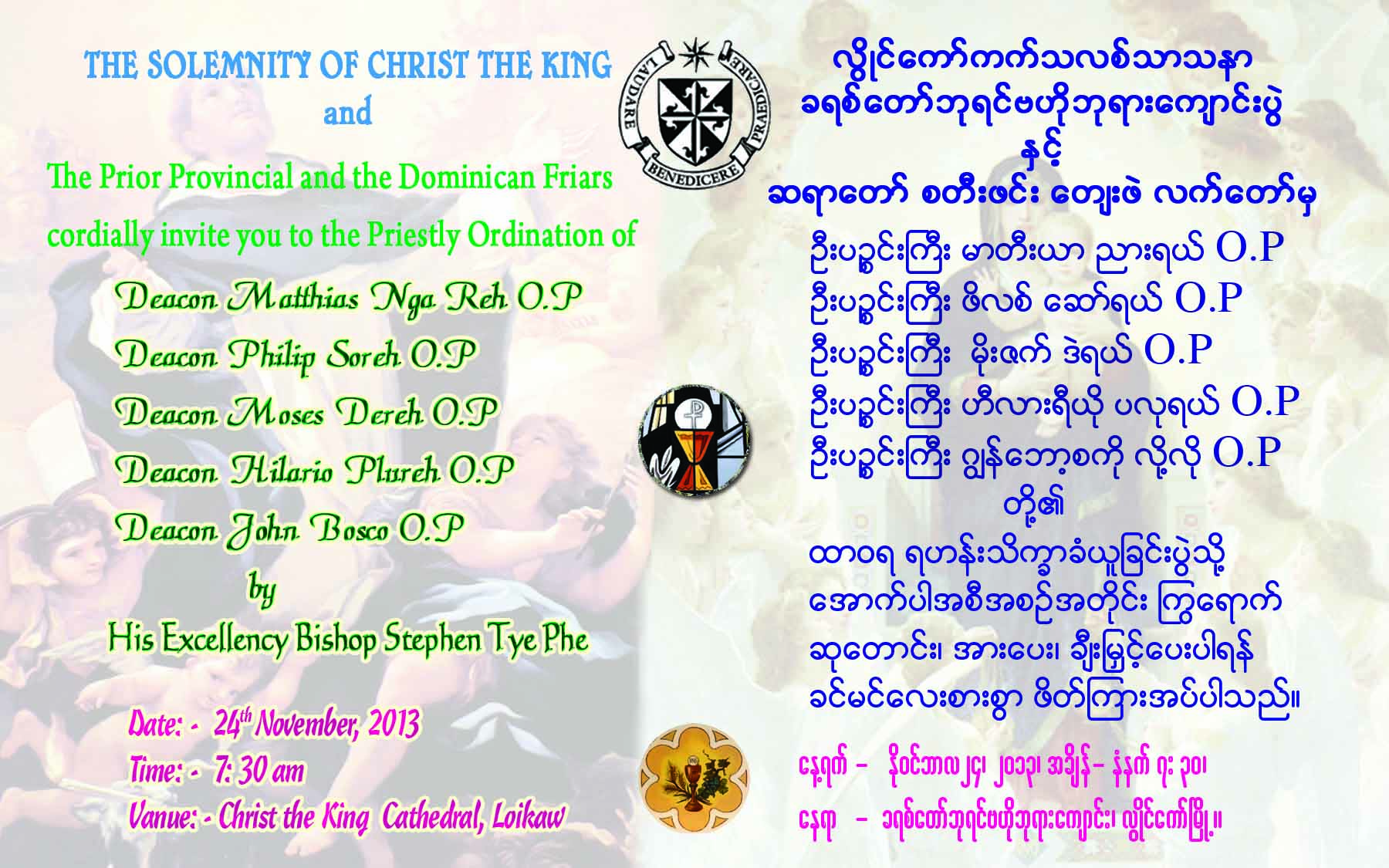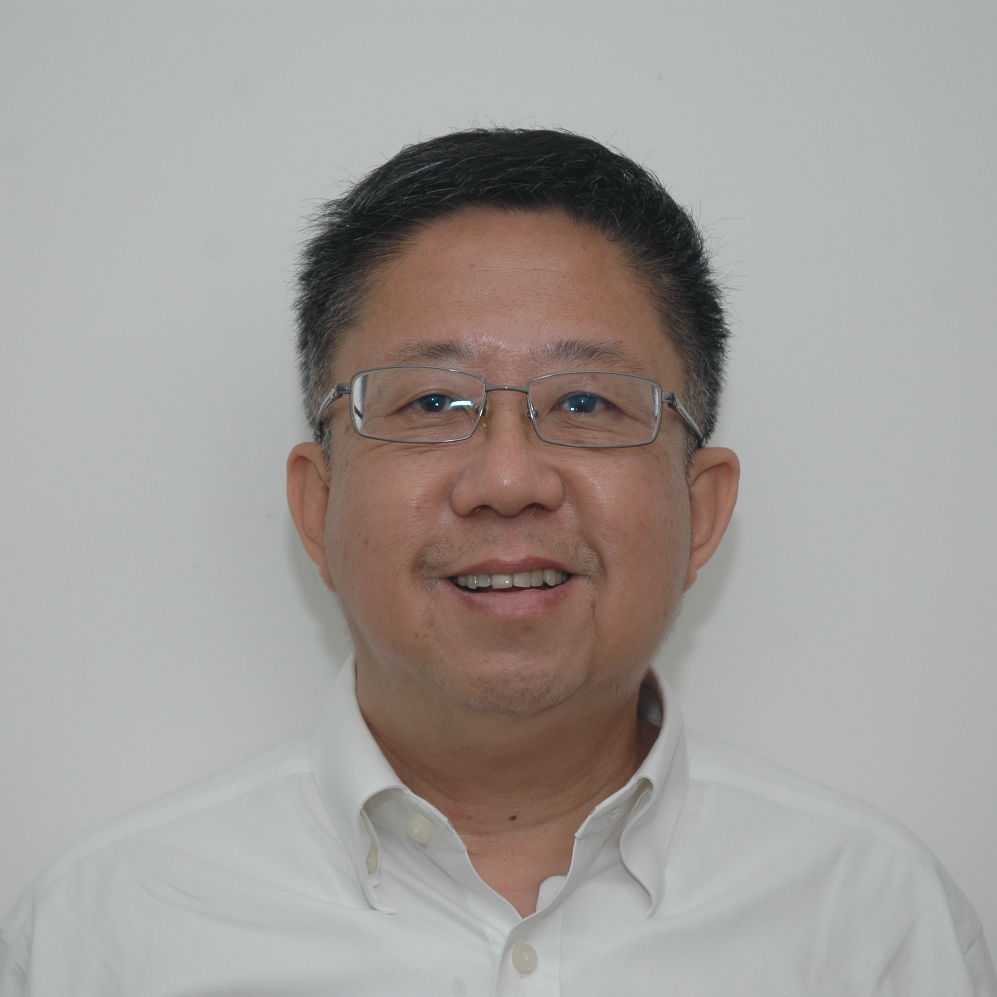
The days 23rd and 24th of November of this year 2013 will be recorded in the chronicles of the Province of Our Lady of the Rosary as part of its history. In fact they are already part of that history. Three important events for us, for the Dominican Order and for the Church took place on those days in the city of Loikaw, the capital of the Kayah State, in Burma or Myanmar (as today the country is known). They were the following ones:
-Â Â the Solemn Profession of two of our Burmese Dominican brothers (Isaac and Mariano);
-Â Â the Opening of a House of the Order under the patronage of St Thomas Aquinas; and
-Â Â the Ordination of seven of our brothers (five as priests and two as deacons).
Three unusual events for that diocese of Loikaw, which, although geographically located in Myanmar’s smallest State (4,500 square miles in extension and around 350,000 inhabitants), however, it has the biggest percentage of Catholics (a total number of 89,000). No wonder the diocese of Loikaw is known as the stronghold of the Catholicism in that “Golden Landâ€, which is what the word “Myanmar†means.
To accompany our brothers on the day of their ordination, all of them natives from that diocese, and to witness what happened thereon, some Dominican representatives from Hong Kong, Macao, Manila and Rome travelled to Myanmar on the previous days. As Provincial, I was fortunate to be one of them. Those were days of frenetic activity, of celebrations, of time to think of everything. The hard work of our Burmese brothers in the preparation even of the smallest details, reinforced by the one of the good people of the place, greatly facilitated the work of the Providence, which disposed the perfect outcome of everything.
Our mission having been accomplished, we returned home with our hearts filled with good memories, great joy and acknowledgement to God and to the brothers. We have brought with us hundreds of images, pictures, and above all… a blessing –the first one– from our newly ordained Dominican priests.
Let me inform you briefly of these three events, as a sort of chronicle, to share with you our joy and blessings.
- 1.     THE SOLEMN PROFESSION OF OUR BURMESE BROTHERS ISAAC Y MARIANO
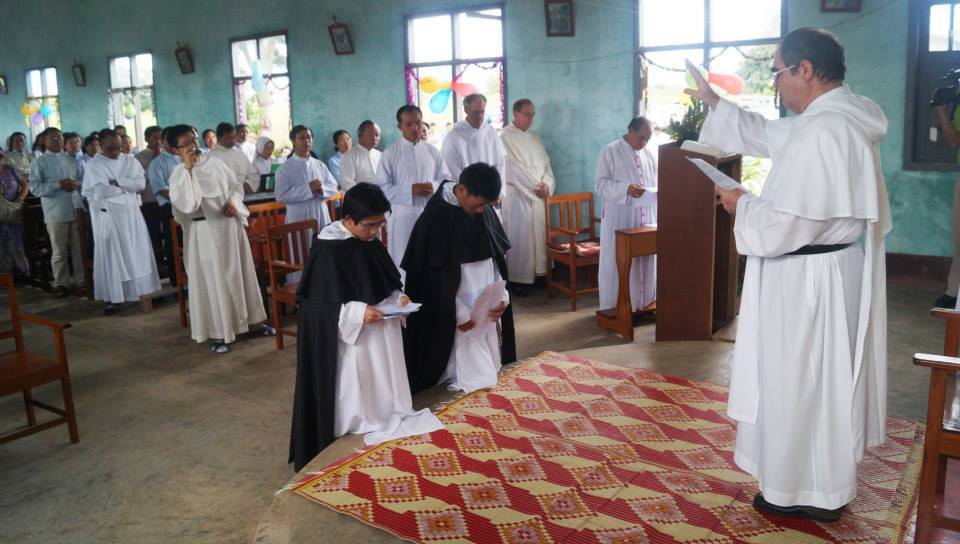
The ceremony was simple but very meaningful. It took place at 2:30 in the afternoon on Saturday, 23rd of November, at the social hall temporarily converted into a church, Â close to our House in the village of Nwalawo, Loikaw. The two bishops of the Diocese (the local Ordinary and his Auxiliary bishop) graced us with their presence. So did the parish priest of the zone, some other diocesan priests, a number of religious from various Congregations and a good group of the surrounding neighbors.
With the two professing brothers prostrated on the ground and all the rest kneeling down, the Litany of the Saints was chanted. It was touching chorusing the names of Dominic, of Albert the Great, of Thomas Aquinas, of Catherine of Siena and other Dominican Saints completed by those of the martyrs of the Province in Japan, in China, in Vietnam and in Spain. The Communion of Saints was palpable in the air.
After some prayers and words of encouragement from the Provincial, we listened in silence the voice of the two brothers promising obedience to God, to the Blessed Virgin Mary, to St Dominic and to the Master of the Order… “until death!†The generous dedication of two lives to God and neighbor sparked enthusiastic applause from the audience. The profession ceremony concluded with an embrace of peace and welcome.
Then we all moved to the nearby building, ready to be solemnly blessed and to be turned into the first Dominican House of the Province of Our Lady of the Rosary in the diocese of Loikaw.
- 2.     THE OPENING OF ST THOMAS AQUINAS HOUSE IN LOIKAW

Honored must have felt the Angelic Doctor at being called after his name the first Dominican House in those mountains of the Karen ethnic group, in Myanmar. The name was chosen by our Burmese brothers, perhaps to indicate that this building, home from this day 23 of November of a Dominican community, is called to become a centre of irradiation of faith and culture as well as of social and human promotion.
Colorful indeed was the opening ceremony: three hostesses dressed up in red costumes embroidered with local designs were waiting at the entrance of the House, holding in their hands a blue ribbon that in a few minutes was going to be jointly cut by the Bishop of the place, Msgr. Sotero Phamo, and by the Prior Provincial, fr. Javier Gonzalez. The ceremony began with the proclamation of a Psalm. Then Father Pedro Luis Gonzalez, the superior and representative of our community in Rome, read the document of erection of the House issued by the Master of the Order, fr. Bruno Cadoré dated 1st November 2013. In a matter of seconds, two strategic cuttings on the ribbon caused the quick rising into the sky, above the rooftop of the house, of a cloud of balloons, carrying with them not only pieces of the blue ribbon itself, but also the gazing looks of children and adults alike. Soon afterwards the eyes turned to the ground to watch how the two bishops, one on the first floor and the other on the second, were assuring divine protection over the house and its inhabitants as they sprinkled holy water on its walls and rooms before giving us all a final blessing.
The awaited ending was the snacks and refreshments spread around on tables. Everyone was welcome and appreciated it. A number of families of the neighboring village remained there to have later on beside the house a heartily dinner which they themselves had prepared.
With the assignation of the first members and the appointment of its firs superior, the first Dominican community in the place was established, and with it, the presence of Our Lady of the Rosary Province in the diocese of Loikaw. A promising beginning!
3. THE ORDINATION OF SEVEN BURMESE DOMINICAN BROTHERS
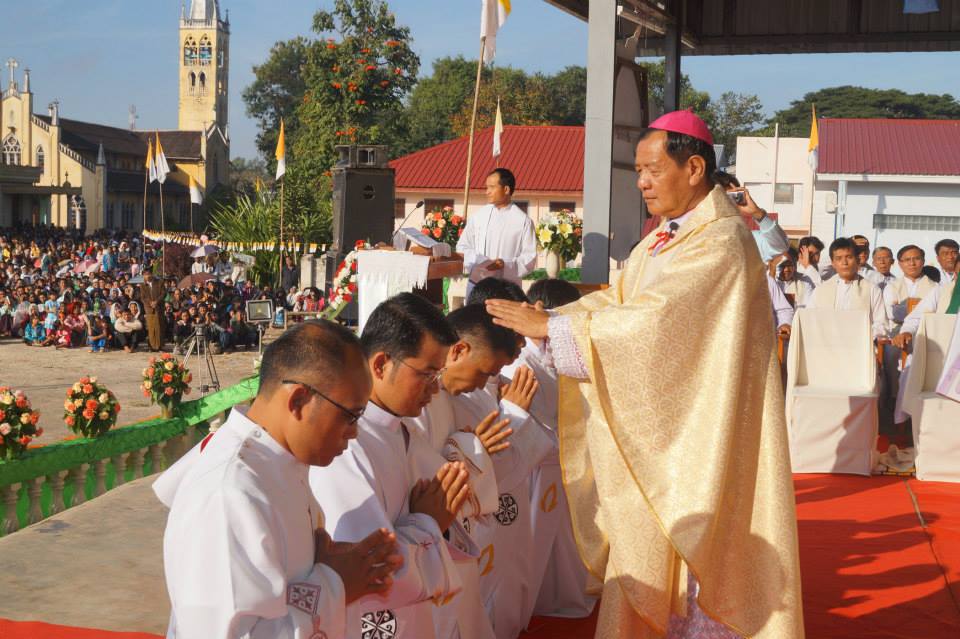
This was the most important event that we had gone to witness: the ordination of seven of our Burmese Dominican brothers (5 as priests and 2 as deacons). The ceremony was held at the Cathedral compound in the morning of November 24, the solemnity of Christ the King, the Patron of the Cathedral of that city of Loikaw.
It was an amazing thing. Neither the old nor the new Cathedral could accommodate the thousands of pilgrims who had come to the place for their patronal feast. People from the city and from the distant mountains, many of them in their traditional costumes, filled the cathedral compound. There was a festive atmosphere in the air. It was seven o’clock in the morning of that Sunday when more than 200 children (boys and girls) dressed up in their first communion attires waited already impatiently in two lanes for the beginning of the procession of the 104 concelebrating priests towards the altar placed under a tent near the new cathedral. Three musical bands took their turns to accompany until the altar the long queue of acolytes, children, those to be ordained with their relatives, concelebrating priests, and the two bishops.
Upon arrival to the altar, the bishop of the place, Msgr. Sotero Phamo, addressed a few welcome words to me and to the friars of the Province present there. I felt obliged to answer him from the ambo with some words, which translated into vernacular language through the loudspeakers, set the tone of the celebration that was about to start: “It is a joy for me and for my brother Dominicans being here today celebrating the feast of Christ the King with you. We are a group of Dominicans who have come from different places (Hong Kong, Macau, Manila, Rome…) not as tourists but as pilgrims to accompany the group of seven brothers of ours from this diocese of Loikaw who today are about to be ordained priests and deacons. This is the first time that such thing happens and hence it is a historical event for us, for the Dominican Order and for the Church. The whole thing has been possible thanks to your Bishop Sotero, to whom we are deeply grateful, and to his Auxiliary Bishop Stephen who kindly accepted to ordain our brothers. We are impressed by the colors and the beauty of the settings, by your religiosity and by your living faith. In very few places of the world can today be contemplated the view that our eyes are contemplating. Thank you very much for your hospitality and for the love you show to our Dominican brothers who today are being ordained and who will remain here with you to serve to your needs. May the Lord bless you and keep your faith strong. When we return to our places we will keep you in our memories and prayer. A blessed day to all!â€
A choir of 300 members, backed up by the crowd, sang the Mass in Gregorian chant: Kyrie, Gloria, Sanctus, Agnus Dei. The solemn celebration went on for nearly three hours under a scorching sun with the characteristic ceremonies of an ordination (Litany of the Saints, Lying of hands, welcome embraces, etc.), at times quite touching because of its uniqueness. Â It is true that in order to avoid falling pray of emotions one has sometimes to imagine that nothing is going on when in reality something and very significant is indeed going on. Some people sowed yesterday so that today we may harvest the fruits of their labor. My heartfelt gratitude to those who initiated the mission of the Province in Myanmar and to those who through the past years have worked in the formation of our young brothers.
The ordination of the first batch of Burmese Dominicans, the opening of a house of the Order in Loikaw and the solemn profession of two native brothers in the Province are very significant events in the history of our mission. It is my pleasure to share them with you all. How I wish that this kind of events awake in us a deep sense of gratitude to God, help us to rise over our miseries, make us overcome the crises and petty troubles existing in our communities and, in a word, enable us to look up to the future with hope. This is what I ask God for.
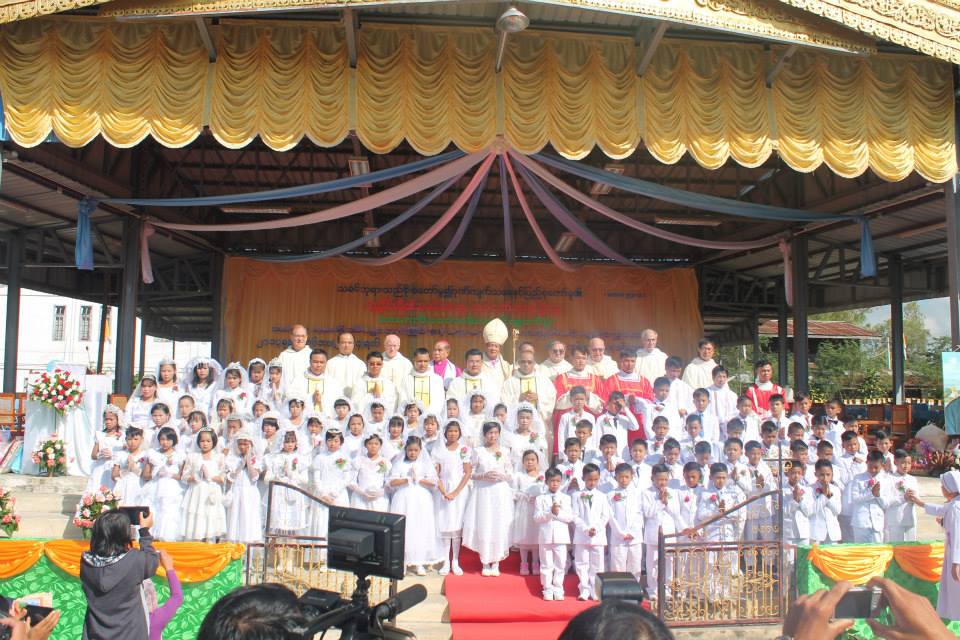

Â
(Communications approved by the Diffinitors but not yet approved by the Master of the Order. The numbers make reference to the Acts of the Provincial Chapter 2013)
Â
10.   Fr. Javier González Izquierdo was elected as Prior Provincial by the Chapter members on August 26, 2013 and confirmed by the Master of the Order on the following day August 27 (Prot. n. 25/13/430 CP). He accepted the office on August 28, taking office that very day during the conventual celebration of the Eucharist, making the prescribed profession of faith and the oath of fidelity to the Magisterium of the Church. From that moment onwards, he continued presiding over the General Assemblies and the Diffinitors´.
11.   The Chapter members elected as Diffinitors of this Chapter the following:
Fr. Mariano González MartÃn (Japan)
Fr. Tomás Miguel Blázquez (Taiwán)
Fr. Raymond Mi (Philipines)
Fr. Pedro Juan Alonso Merino (Spain)
Fr. Ãngel Gabriel Villasmil Bermúdez (Venezuela)
Fr. Emiliano Pérez Peña (houses under the Provincial)
Fr. Hyacinth He
Fr. Mario Jabares Cubillas
12.   The Chapter members elected Provincial Councillors the following:
Fr. Bonifacio GarcÃa SolÃs
Fr. José Luis de Miguel Fernández
Fr. Alejandro Salcedo GarcÃa
Fr. Christopher Joannes Chor
And as substitute Councillors of the Province the following:
Fr. José Ãngel López Legido
Fr. Timoteo Merino MartÃn
13.   The Chapter members elected Fr. Kleyver José GarcÃa Botero as socius of the Prior Provincial for the elective General Chapter; as diffinitor for the first General Chapter to Fr. Rafael Laya Hidalgo and to Fr. Pedro Juan Alonso Merino as his socius; as diffinitor for the second General Chapter to Fr. Ramón RodrÃguez and to Fr. José Antonio Sanabria Santervás as his socius.
 14.   The sessions of the Diffinitors took place from 4 to 11 of Septermber 2013.
 15.   The Prior Provincial, with the consent of the Diffinitors, chose Fr. Hyacinth He as his socius.
 16.   The Prior Provincial, with the consent of the Diffinitors, chose Fr. Fernando Muñoz MartÃn as Provincial Secretary.
 17.   The Diffinitors named Fr. Bonifacio GarcÃa SolÃs as Bursar of the Province and to Fr. José Salas Tomé and Fr. José Ãngel López Legido as his assistants.
 18.   The Diffinitors named Fr. Francisco de las Heras Miguel as provincial Secretary of Missions.
 19.   The Diffinitors proposed Fr. John Kim Sang Tae to the Master of the Order for his appointment as Regent of Studies.
 20.   The Diffinitors named Fr. Timoteo Merino MartÃn as Master of Novices in Hong Kong.
 21.   The Diffinitors named Fr. Jarvis Sy Hao as Master of Students in St. Dominic´s Priory in Macau, and Fr. José Gregorio Lobo Izquierdo as Master of Students in the Priory of Fray Bartolomé de las Casas, in Caracas, Venezuela.
 22.   The Diffinitors named as Director of the Pre-Novitiate: Fr. Peadar Beinidict Mac Cionaoith in Kowloon Tong, Hong Kong; Fr. Juan Bautista Ko Sung Kyun in Seoul, Korea; Fr. Antonio González Izquierdo in Singapur; Fr. John Maung Sui in Yangon, Myanmar; Fr. Santiago Sáiz González in Dili, Timor Leste; and Fr. José Gregorio Lobo Izquierdo in Caracas, Venezuela.
 23.   The Diffinitors named Fr. Pedro Luis González González as incharge of the Student Brothers taking institutional studies in Rome..
 24.   The Diffinitors named Fr Ramón RodrÃguez Alonso as representative of the Vicariate in Spain for the Council of Formation of the JIP.
 25.   Likewise, the Diffinitors made the following appointments:
Fr. Fausto Gómez Berlana, Provincial Promoter of Permanent Formation.
Fr. Emiliano Pérez Peña, Provincial Promoter of Justice and Peace.
Fr. Fernando Muñoz, Chonicler and Secretary of Information and Statistics.
Fr. Emiliano Pérez Peña, editor of the Provincial Bulletin.
Fr. Teodoro González GarcÃa and Fr. Miguel Ãngel Medina Escudero, Provincial Promoters for the causes of Beatification and Canonization.
Fr. Vicente Sánchez RodrÃguez, Provincial Promoter of the Dominican Family.
Fr. Mariano González MartÃn, Provincial Promoter of Vocations.
Fr. Tomás Polvorosa López, Provincial Archivist.
Fr. Peter Yu Jong Pil, Provincial Coordinator for the Internet.
Fr. Edmond Eh Kim Chew, Moderator of the Provincial Center of Institutional Studies, in Macau.
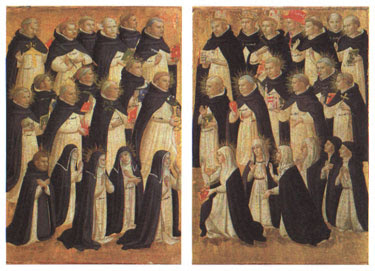
PROVINCIAL CHAPTER  – AVILA 2013
 CHRONICLE NUMBER 10
What is best can also end. Thus today, 3 September, the first part of the Provincial Chapter ends, that is, the study of the Commissions and the discussion of the documents. The second part is still missing which shall be in the hands of the Diffinitors or the eight friars who shall prepare the final text and take determinations on topics which are somewhat reserved.
 the elected diffinitors of the province are:
 Fr. Mariano González MartÃn
 Fr. Tomás Miguel Blázquez
 Fr. Raymond Mi Yuchun
 Fr. Pedro Juan Alonso Merino
 Fr. Ãngel Gabriel Villasmil Bermúdez
 Fr. Emiliano Pérez Peña
 Fr Hyacinthus He Yeosun
 Fr .Mario Jabares Cubillas.
This group shall meet afterwards with the secretariate of a new creation: the inter-diffinitory, that is with the other diffinitor-friars of the three provinces that had also elected their Provincials during this time.
 This was the central theme of our reflection: to see what does it implies on the fact of collaboration and not integration in the one Dominican Province which shall come to pass in the Iberian Peninsula. The Province of Portugal and our Vicariate in Spain are left, as of now, as members who will collaborate but not to join in. The collaboration is already functioning in various areas: preaching, liturgy, the Dominican Family, etc… The members of the JIP (Junta Ibérica de Provinciales) shall be discussing the re-structuring of the Order in Madrid, the preparation of the Jubilee 2016 when the Order celebrates its eighth hundredth anniversary.
The affair is so important for it implied the future, not only the Vicariate of Spain but the structure of the Province of the Rosary. That us why we spoke of a “historical error†if an equivocal decision is taken. It is not a mere sentiment of fidelity or pertenency, but of identity and survival.
We have dedicated a short period in the morning to read an exemplary document. It is a human and theological reflection on Our missionary identity. It is ideal as a prologue of the Acts of the Provincial Chapter. Afterwards the democratic elections thought of by our laws: the diffinitors, the councilors and delegates of the coming General Chapters.
The good also has to end. In one of the chronicles, I alluded an inverse relation between age and possibilities. When age is advanced, there are less possibilities. The third age (aging) is robbing us of the future. It is a grace that the Province of the Rosario still has a future: in Venezuela, in the countries in the Orient. There are Dominican vocations: theirs are the possibilities, theirs is the future.
The chapter has a deep sense of gratitude towards Fr. Javier González Izquierdo. Thankful for the services he had given during as Prior Provincial. And we hope that he would be successful in this new term. Thanks for his work, his simplicity, his intimacy and optimism.
From the elderly, a counsel: I would like to end these informal chronicles with a recognition and a recommendation from my part. Thanks to all those who have supported me, from Avila and from afar, of reading and commenting this page in a daily basis.  This is probably my last chapter.
And a counsel: I would like to remind all those who are working outside of the country of birth some prophetic words: They are not words from a Pontiff nor of a religious Founder, but words of Don Rómulo Gallegos, the author of Doña Bárbara, the best novel of Venezuela. “I am animated to love persons although in the region predominates injustice and barbarity. He tells us more: “There is a good race that loves suffers and hopes.â€When there is love to the people, then all difficulties will be overcome. May God help us to love the people which whom we work.
BenjamÃn GarcÃa Fernández (chronicler and nothing more)
PROVINCIAL CHAPTER – ÃVILA 2013
CHRONICLEÂ Â NUMBER 9
 On Monday, 2 September the work of the chapter resumed. The friars who left to attend the Sundayapostolic commitments came early. The General Assembly tackled a transcendent problem: the fusion of the four Provinces of the Iberian peninsula (The Provinces of Spain, Aragon, Betica and the Rosary). The initials JIP (Junta Iberica de Provinciales) is used.
The fusion is not a caprice but a necessity: the number of friars has dropped drastically and it is imposible to maintain all the ministries and the buildings that still exist till now. In order to seal this fusion, the date was fixed on 2016 when the Order reaches eight hundred years.
In the Province of the Rosary it had decided no to integrate herself but to collaborate. This Province is formed by Vicariates and does not have any territory in Spain: She only has houses of formation. It is a only case within the Order.
The chapters brothers decided to dialogue on this topic within time limit. Only the Vicariate of Spain has a relation with the three Provinces. The vicariates of the Philippines, Japan, Taiwan, Hong Kong and Venezuela will not have any meaning if the Vicariate of Spain separates.
To the six chapter friars from Venezuela, we are happy with the nomination of our Nuncio in Caracas as the Secretary of State of Pope Francis.  The “chavista†government did not help him in any way during his term as the nuncio. He is well trained , thus to face and play with the wild bulls. The Pope during the World Youth Day in Brazil 2013 spoke to the bishops of the challenges the continental (Latin America) has to face. In a similar way, the chapter also marks the path we ought to run, with its challenges and difficulties.
The Asian brothers formed a special commission and understood one antoehr in English.  Their document reflected on the present challenges of the Province.  It is not a juridical document, but a theoretical-realist meditation . It was read, commented and was enriched in the General Assembly. One has to know how to conjugate these three concepts: salvation, preaching and the implantation of the Order.
A question was raised if the young friars who are being ordained are to work in their own countries of origin or they are for the Province, in such a way that they can be assigned to any other place or country. There are Koreans, for example who wished to leave their country. The majority of the chapter brothers preferred the universality of the Province. It is missionary without nationalist limits.
It is proper of the wise to doubt. At the end of the Chapter where so much had been said of the East, of Europe and of Asia, a brother raised a reasonable doubt: “ our mission in Timor, is it in Asia or in Oceania? “
There was also humor masked in technology. In the so called “assisted†Residence  or the Infirmary, there are eight friars, some sickly and others elderly. One of the was impressed when he say a photo of a group of Bishops and Cardinals who came from Rome to greet the Chapter brothers, among them there was a  dwarf and another wearing a winter bonnet. (thanks to Fr. Alejandro Salcedo and his state of the art technology!) Humor is a sign of good health.
BenjamÃn GarcÃa Fernández (chronicler and nothing else)
 PROVINCIAL CHAPTER – ÃVILA 2013
 CHRONICLE NUMBER  8
 30 August, Friday. The chapter continued its rhythm, slow and a little morbid. Some members are surprised by the protagonism of the Venezuelans. They sing the psalms, animate the Eucharist and are not mute in the discussions. Today we discussed about the Promotion of Vocations, and the Academic formation of the young Dominicans. The situations are different according to nationalities. There are young men who call on our convent doors  who are already professionals. Some know English, others have to learn it. To all they are asked for a medical certificate and the will to serve God in the Order. Some of them are asked to produce a baptismal certificate since the whole family is gentile. The Asians are impenetrable, it is not easy to enter into their psychology.
 We feel with great respect before the document on the Government of the Province. The democratic convictions and those that are individualistic clash at times with the vow of obedience. But the outline is well structured, and it was easy to approach it. We are paralyzed when touch the point on poverty. The sensibilities one and other friars are in the antipodes. To be poor in Japan and to be one in Latin America is not the same.  For some friars it is scandalous to travel to Spain every year while for others it is normal. Leaving Japan after a certain period of time is a necessity. To leave the underdeveloped countries is almost a luxury.  The friars are a family, and in the family all are equals.  That is why our laws cannot be distinct for some and for other members.
Brother Ãngel Gabriel appeared today with some monastic garb. Bad sign!  This was proven a few moments later: a headache had sent him to bed. The vile tongues attribute the abrupt malaise to the habit. But it was given by the Masgter of the Order in Croatica. How can this be understood!!
In one of the commissions, in speaking about Asian theology, it loomed in a distance a an original theological and liturgical reflection. Latin America created the theology which it needed: liberation. The inter-religious dialogue with the Asian traditions was seen to be fruitful. But the Spanish friars working there knocked us out: The Christians, the laity and the clerics are almost slaves to the directives and ceremonies from Rome. Obedience and the imitative sense of the Eastern Christian prevailed over creativity.
It is not prohibited to dream. They are commemorating fifty years of the mythical discourse of Martin Luther King: “I have a dreamâ€â€¦ Today there is a Afro-American in the presidency of the United States. In a shorter time we want to see how the Dominicans in Myanmar, Korea, China and Japan do their theology and celebrate their liturgy. They are preparing themselves for that.
In these restless chronicles nothing had been alluded on the Chapter liturgy. There is nothing new under the sun during the Chapter. Some brothers lament there are no Dominican sisters of commited lay women . They are more creative, and discover signs and gestures which men do not occur to us.  Aside from the chanted psalms, some in the traditional “pilgrims’ tune”, the celebrations were imply rituals.
And we as workers of the vineyard of the lord, we have a day and a half of relative vacation. Though we cannot make pittance at the expense of the State as did some Andalucian labor leaders. Good grief!
Happy weekend . I leave you to rest. Till Monday, God willing.
BenjamÃn GarcÃa Fernández (Chronicler and nothing more)(Trans by J. S.)
PROVINCIAL CHAPTER – ÃVILA 2013
CHRONICLE NUMBERÂ Â Â 7
 The Provincial Chapter is entering its final leg: the official documents are being written after previously being discussed in the plenary assembly. Some had to be returned back “to the stables†for a more concise elaboration. It is not easy that all agree in topics so varied they are going to approve that main idea what would orient the life of the Province of the Rosary in the coming four years.
The local paper “Diario de Ãvila†dedicated a full page with photos and all to our multicultural meeting.  The event was news worthy: To elect in Avila a Spanish superior who resides in Hong Kong; that the electors come from three continents.  And the electors form an amalgam of varied ages: for 82 to less than 30. This is not a daily occurrence.
The first to be discussed and approved was those referred to economic administration. It is a thorny topic, not for us for what we now call “money launderingâ€. The Province of the Rosary work in many countries. She has to pay for the young brothers who study in dollars, yens, Columbian peso. The banking norms are difficult… we are scrupulous with legality.
The document of Study in the Province is also approved. The formation of a Dominican (friar) is long and arduous. In the past, Latin is demanded to become a priest. Today what is demanded is English and another language.  Fr. (Miguel Angel) Sanroman had just published in Chinese the History of the Church in Formosa. He is from Avila and they do not speak Chinese here.  The presentation of the document on Study is all a magisterial page. It is a privilege to listen reflections such as these.
The document on the life of our seminarians (sic: Brothers in formation!!). There are eighty of them in the Far East.  The national press (in Spain) remembered the death of a Forensic Doctor well known in Spain.  This doctor was asked what took place in the mind of men who are capable of killing other men. We ask ourselves the same question: What is there in the heart of missionaries who had given up everything to be killed for the Gospel? What is there in the mind of the young who profess obedience till death? These are not frivolous questions.
Community life is a repetitive topic in the Chapter.  An evident sign there had been failures. Today the individualistic sentiment is very much accentuated, seeking personal realization. To live in community, to work in the communitarian project, to preach from the community, to inform the community, to let one (and one’s work be judged and evaluated by the community.
In Venezuela we say: “to be left like a guayava treeâ€, it is a kind of shirt that is taken from without. In the political context it alludes to: “a she-goat that bore three kidsâ€.  One of the kids is left without a breast to feed, without sustenance, without future.  Something similar happens to the Dominican friar who plans his life and his work at the periphery of the community.
My commission reflected on the specific apostolate of the Province. We remembered Saint Paul, Saint Dominic and all the missionaries who brought Christianity to the Far East. We asked the communities to prepare the Sunday homilies as a group or in teams.  Multiculturality is a privilege and a responsibility
The day ended without any novelties.  No one jumped over the fence , nor was there a “Juan Palomo†nor vultures keeping an eye on the meat. As it is late and cold, I greet you good evening. Amen.
BenjamÃn GarcÃa Fernández, O.P. (chronicler and nothing more) (trans J. S.)
PROVINCIAL CHAPTER – ÃVILA 2013
 Chronicle Number  6
 On 28 August, the feast of Saint Augustine was a successful day for the members of the Chapter and for the rest of the friars of the Province of the Rosary. Brother (José) Bravo complained to us  [before accepting our greetings for on the 29th he is going to be older]. He said: “We have been ‘in labour’ (“pariendoâ€) the whole dayâ€, as they had been waiting long to know the name of the elected one to serve as the Provincial superior.  It is certain that Rome was late in the confirmation, perhaps it is because that the Master was out.
Fray Javier González Izquierdo took possession of his office. And two young men made the solemn profession before him “promising obedience till death!â€Â Those were great words! Brother Carlos (Simbajon) is Filipino, he had lived for a while in Avila and is learning the language. Brother Joachim (Li) is Chinese, he is studying History of the Church at the Gregoriana in Rome. Since 1955 (sic) no professions had been celebrated in this Royal Monastery, the Prior, Brother (Rafael) Laya told us.
 I was not able to attend the two events. I had to go and be fitted with some lenses which are made in Paris. The period of adaptation for these lenses is harsh. I hope to enjoy a better physical vision because, they do not repair the mental one in France. A Venezuelan friend inquired me what “position†(“camburâ€) will these meetings bring to me. He even clarified this with me: do not tell me that you are still ‘brushing your fur’(“guapearâ€) to kill little tigersâ€. I shall leave one of my compatriots to translate these terms.
What did we see in Brother Javier to have him re-elected? Among ourselves we do not make electoral campaigns. Though yes we underscored convincing qualities: not activism but reflection, equilibrium, open to counsels, “to be†rather than “to doâ€, understanding humanist. These are the words which we repeated frequently in the Chapter.
 (Emmanuel) Kant said that “man is made out of twisted woodâ€. The human being carries in him something twisted in his genes. That’s why it is difficult to build the kingdom which is the mission of the Dominican and of the Christian.  The twistedness is given inside and outside the coenobium. This is why we have to continue making declarations, exhortations in the chapter.  In Madrid I was told: “the chronicle is read more than the official chronicles.†This is lamentable.
 I am not going to “belabor†the curious who are not Venezuelans. On our land of grace to be able to have a “cambur†is to place oneself in an comfortable and productive position.  The word “Guapear†is to have fortitude (or better to build up courage) or to work even without seeing results. And “matar tigritos†is to make sloppy work in a position or a business which is socially renowned and source of wealth. Then what “cambur†shall the chapter brothers have? At this moment, there are long sessions of work and the privilege of working together with the friars so dispersed throughout the world: Europe, Asia, Venezuela: not one of us deserved to enjoy such human, apostolic and gospel richness.
 One final observation: there are friars who asked for the “dry law†which we have implanted on Venezuela. It seems that they had not read the Bulletin edited by Brother Emiliano (Perez) in Hong Kong. I leave you with the little worm of curiosity. And with this, another curiosity: when at lesser age, more alternatives, and a greater age, less possibilities; and those who are in the third age (the elderly), they have the future at their backs.
BenjamÃn GarcÃa Fernández (chronicler and nothing more)
(translated by J. S.)








